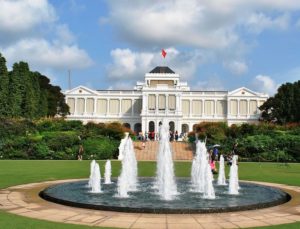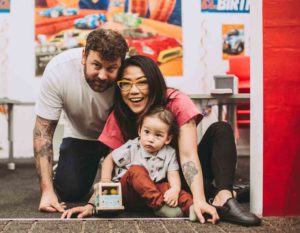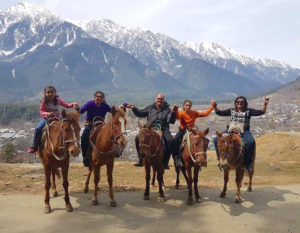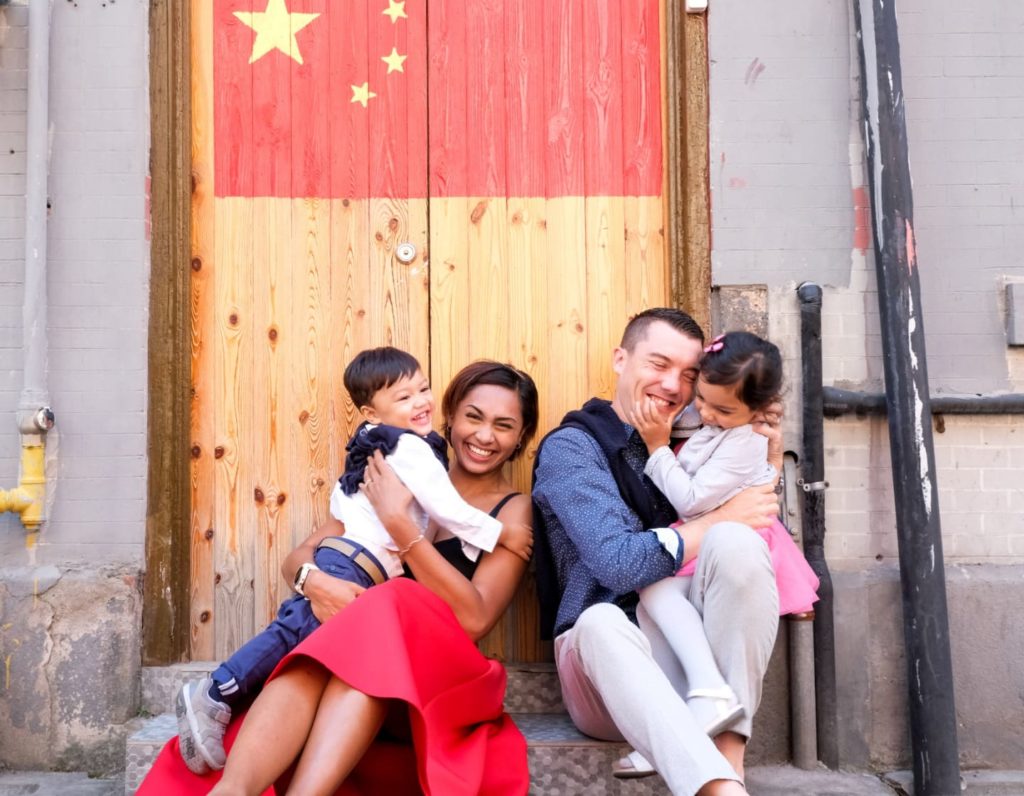
F&B veteran Jeya lives with her French husband and two children in Shanghai. Here she reflects on Singapore and shares her story
Jeya Ibrahim-Lecomte talks about the close-knit community of expats she has found and how she is grateful for the multi-racial environment her kids are growing up in (although some racism towards non-White and non-Chinese people exists). Read on for why she doesn’t speak English to her kids, why she thinks the education system here is too competitive and ultimately why she thinks Singaporeans have it so good in Singapore.
Read more from other Singaporean mamas who live abroad!
Can you tell us a little about yourself?
I’m a Singaporean of Malay and Indian descent. I was born in 1981, which makes me 40 this year. I have two children, Nélia, who is six years old, and Louis, who is 4.5 years old. I studied mass communications at Ngee Ann Polytechnic, majoring in journalism, marketing as well as acting and directing. After getting my diploma, I started waitressing and fell in love with the hospitality business. I moved on to work in hotels. This was when I decided to make a career in the food and beverage (F&B) sector.
What brought you to Shanghai? How long have you been living overseas?
In 2004, I visited a friend who had moved to Shanghai. During that two-week visit, I fell in love with the bustling, vibrant, messy yet modern city. Shanghai was on the cusp of change – like a rocket that was about to take off. I couldn’t resist. I then visited Shanghai another two to three times. The F&B industry was growing and I wanted to excel in this field. I did not have a diploma in hospitality but I was very ambitious. The city needed foreigners with experience and drive and I wanted to rise up the ranks as fast as I could instead of being contented with the slower progression I saw in Singapore, so I decided to try and find a job in Shanghai. In March 2006, I went for a couple of interviews and was hired as a floor manager in O’Malley’s Irish Pub, the oldest Irish pub in China. I officially moved to Shanghai in May 2006 and have not left the city since.
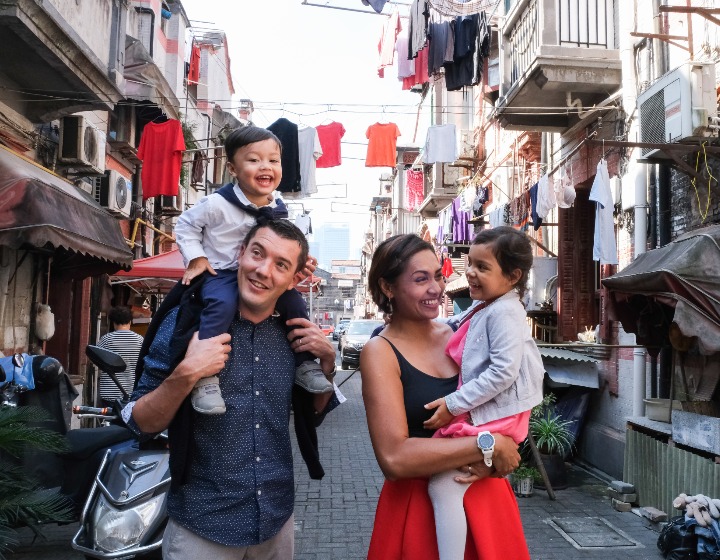
Favourite aspect about living in Shanghai?
Shanghai reminds me a lot of home. It is extremely safe – we could go out till 3 or 5am and do not have to worry about sexual assaults and muggings. I love the international community in Shanghai. It is extremely close-knit. If someone needs help, the community would come together to help that person out. A few years ago, there was an American university student who just had a newborn and needed help. The community came together to help him with donations of cash, baby clothes and gear and even hands-on training on how to take care of a baby.
Currently, we have news of a French teenager who is suffering from a crippling bone disease, and again, the community has banded together to help in every single way. Our friends who had lived in both Shanghai and Hong Kong have mentioned that this close-knit community is unique to Shanghai – the sense of having a family in the community away from home. Also, Taobao and online grocery shopping come a close second! Convenience at its best!
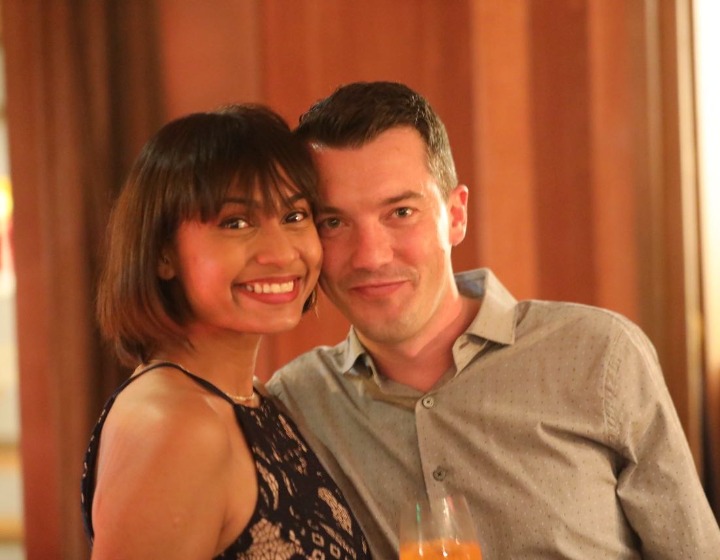
And the worst part?
That hint of racism. Most of the time, things are great but there are still pockets of racist sentiments towards non-White and non-Chinese foreigners.
What are the current restrictions in Shanghai due to Covid-19?
The people in Shanghai have been very proactive. We were in Shanghai at the start of the pandemic last year. Everyone had masks on and stayed home most of the time. By the time we came back from France end of March last year, it was already common practice to wear masks everywhere. The mask-wearing rules were loosened last summer but the Chinese government encouraged people to wear masks and practise proper hygiene at the end of December – and everyone still takes these precautions. There are some restrictions on outdoor markets, limits on the number of people in restaurants or concerts but for the most part, life goes on as usual.
The only lasting impact of Covid-19 restrictions is on schooling. Before the pandemic, all of us were already used to putting on masks on highly-polluted days. Since the pandemic began, our children have had to wear masks on the bus to and from school as well as in certain areas of the school. Parents are not allowed to go onto school grounds and parent-teacher meetings are now done via Zoom video conferencing or calls.
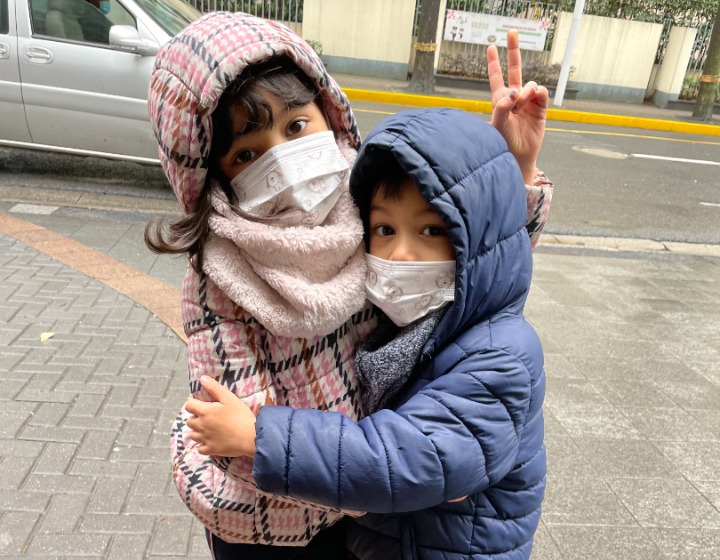
How have you and your family been coping in the midst of Covid-19?
We have been very lucky that we managed to stay together throughout the whole pandemic. We know of families who were separated for months before they could be reunited due to the closed borders. Many are still separated till this day. We had to quarantine in a hotel when we came back from France in March 2020. While it was stressful for everyone, it has given us a renewed appreciation of family, and of being together. My husband is French and we try to see both our families at least once a year. My parents will fly in from Singapore, whilst we will fly to France once or twice a year. With the ongoing pandemic, it has been a year since we’ve seen our families. It has been tough for the children as well as for us.
How do you think parenting in Shanghai differs from parenting in Singapore? What do you appreciate most about it?
I find the emphasis on education and enrichment the same in Shanghai and Singapore. But what I do appreciate about Shanghai is the fact that our kids are able to mingle and be friends with kids from very different backgrounds. Here in Shanghai, our kids have friends who are biracial or who are from countries like Poland, Germany, France and the United States. Growing up in a multiracial environment, I’m used to being with others who are different from me. For our children, it doesn’t matter where the other children come from or how they look like. It doesn’t even matter which language they speak! If English or French doesn’t cut it, there is always Mandarin, the go-to language in the playground. I am very happy that we are able to provide our children with the opportunity to see beyond origins and skin colours.
Did you give birth to your children in Shanghai? If yes, what was memorable about the experience?
No, due to my pregnancy complications, I was advised to go back to Singapore for the births.
Can you talk us through your career pre- and post-baby?
Pre-children, I worked in operations in F&B before transitioning to become a marketing and strategy manager, focusing on F&B. There were not many people who specialised in this sector and I was happy to merge my education with my experience. I worked for the Shangri-la Group for six years, up until the birth of my second child. Then, I went to work for AB InBev for three years where it became apparent how hard it was to balance work, family and personal satisfaction. I’ve always been a worker, but as I grew older, I wanted to have a better work-life balance.
Like most mothers, I would wake up at 6am, get my first child ready for school, get her on the school bus at 7am, then start preparing myself before waking my son up for the school bus at 8:45am. I would reach the office at 9am, working through lunch most days and I would try to be home by 7pm before the nanny goes home. I cook dinner and put the kids to bed at 8pm, before having dinner and continuing to work till midnight to 1am most days.
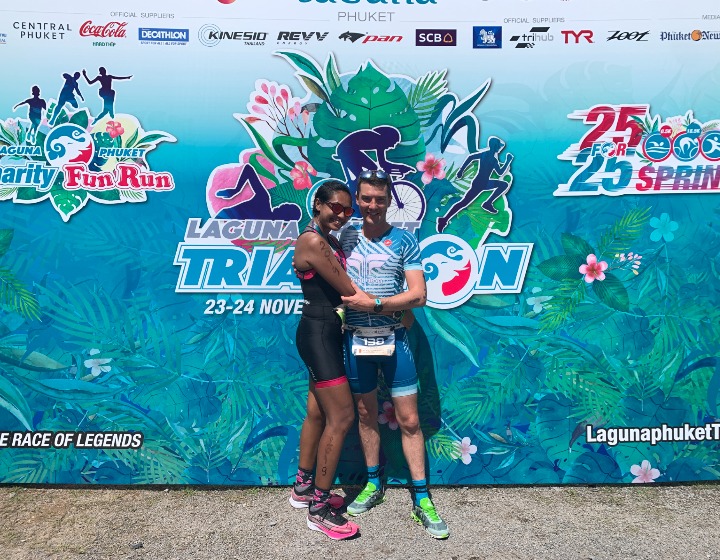
Having a boss who understands this rhythm is extremely important. To add to the whole mix, I started running to lose my post-pregnancy weight – and also to get my focus back in life. But towards the end of my career with the company, I was expected to put in 10 to 12 hours in the office and to live for my career. As much as I want to excel, I do not want to achieve professional gratification by putting aside my family and personal needs.
So in 2020, I decided to focus on my own projects. I’ve created a company with like-minded individuals. It has been tough living on one salary for most of last year but I am determined to reap the results of my vision. Working from home has allowed me to see my children more. Coupled with Covid-19, we eat at home more as well and we end up eating healthier!
Favourite kid-friendly restaurant in Shanghai?
MUST Grill is our favourite, as it is just a few metres away from our home. It has a large terrace and during pre-pandemic times, they even had a bouncing castle on weekends. There is also CAGES with its indoor playground, sports on large screen TVs and great beers on tap. Din Tai Fung is great too. There is a lady who works in the outlet that we frequent who has seen both our kids grow up! The food is delicious, service is amazing and the kids always leave with a mini dough animal or fan!

Top five places in or around Shanghai you would recommend to parents travelling with kids and why.
1. Shanghai Natural History Museum – Definitely a great way to spend an afternoon indoors when the weather or pollution is bad.
2. Wildhomestay – Just three hours away from Shanghai, this is a natural retreat with great walks near pristine streams, farms and no internet whatsoever outside of the rustic bed and breakfast. Inexpensive yet beautiful.
3. Jump360 – An indoor trampoline park for both kids and adults! Need I say more? It has two branches in Shanghai.
4. Shanghai Disney Resort – If you want to check this off your list and if your kids are into all things Disney.
5. Kerry Hotel Pudong, Shanghai – I was part of the team that launched this hotel back in 2011 and we love coming here for a great staycation. They have the largest children’s playground in a hotel in Asia, amazing food, an indoor Olympic-size pool and a kiddie pool too.
Any advice for surviving a flight with young children?
Snacks. Lots of snacks because there is no such thing as too many snacks! Fruit compotes, raisin boxes, crackers, pre-sliced brioche breads, fruits… anything that is easy to eat. Kids’ earphones because they come with sound level controls for young ears. Get multiple converter jacks too in case the ones that come with the earphones don’t work.
A change of clothes for them and for you. I once barely survived three flight connections with two toddlers, one of whom had serious motion sickness at take-off. His puke got onto my clothes. I had a change of clothes for him but not for me – and our baggage was lost during the transfer for four days. Fun times! Don’t forget to bring a table with kid-friendly games and activity travel kits. They come with plasticine, drawing paper, pencils, stickers and stamps to keep little ones busy.
Other must-haves includes a muslin cloth or a small blanket, and easy-to-pack toys. If the children are not yet toilet-trained, I would suggest bringing one diaper for every three hours of the flight, milk powder carrier and bottles at the ready, a travel-friendly stroller you can bring onto the plane as cabin baggage and motion sickness essential oils (I’m a firm believer in essential oils!).
It sounds like a lot, but by the end of the flight, you’ll be down by at least half the snacks and perishables. We travel everywhere with the kids. My husband is a triathlete and I like to participate in relay teams as well. Plus pre-pandemic, we travel at least twice a year to France with at least one connecting flight. I’ve learnt that packing more will save me from being stressed in the plane. Packing things in Ziploc bags makes categorising items a breeze and is also easier to handle at customs checks. Can’t stress enough – pack snacks!
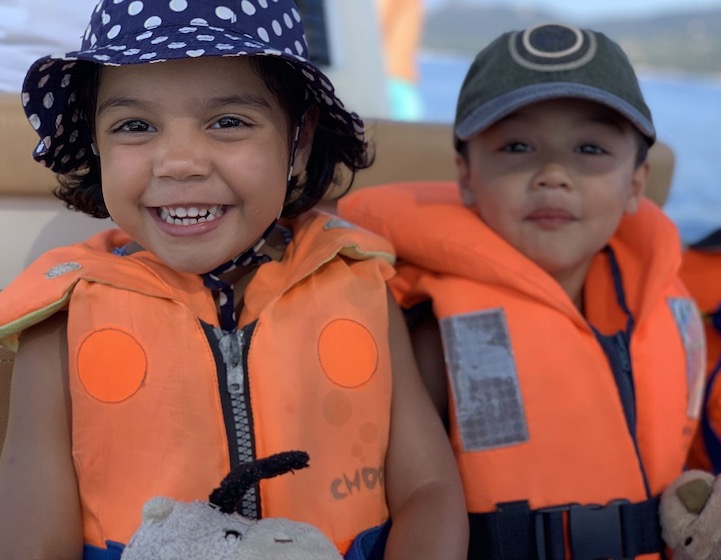
Is there something that you do to keep your children in touch with their Singaporean roots?
We are a trilingual family. My husband speaks French, our nanny speaks Mandarin and I speak to the kids in Bahasa Melayu as I want them to know their roots. Growing up, I didn’t learn Tamil, as my dad speaks fluent Malay. I regret not learning the language as it is a part of my heritage.
For our children, a decision we made before having them is that we need to keep them in touch with their roots. Like most Singaporeans, I speak English more than Bahasa, so it does feel like I’m relearning the language when I made the decision to speak only Bahasa with my kids. As my kids learn to connect to their roots, this is also helping me to become closer to my roots too.
I also stress to the kids that they are Singaporean-French and we try to do a video call with my family once or twice a week. They speak with my family in Bahasa as well. Due to Covid-19, it is hard to go back home but we hope to bring them to Singapore once this pandemic slows down. My kids know Singaporean food pretty well though. Chicken rice, fishball soup, yong tau foo and laksa are major hits!
Best souvenir one could bring back from Shanghai
– For a child:
A cushion in the shape of a xiao long bao! With their name embroidered on it! There are some stores that sell them at the touristy streets near Yuyuan Garden but I’m pretty sure there are other stores in Shanghai that sell them too or you can find them on Taobao.
– For a mama friend:
SAN | XIA has beautifully made from traditional Chinese bamboo baskets and steamers by HOME SWEET HOME, a not-for-profit organisation that employs and helps disabled and homeless people.
What do you find is the hardest part of being a mother living in a foreign country?
Missing the extended family. We don’t have the support of our own parents and siblings since we live so far apart. Having good friends here can almost replicate that feeling of closeness but it’s not the same.
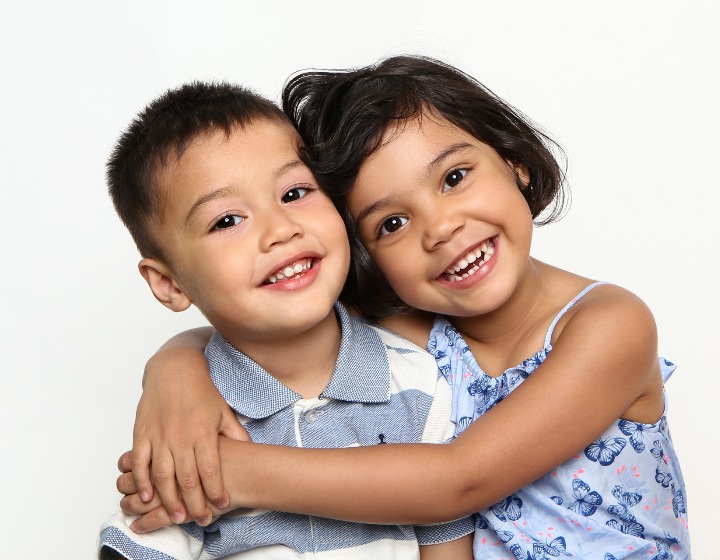
On raising multilingual children…
Making sure that they have the right base and sticking to it. We had advice from a child educational psychologist before we had kids to stick to our chosen language for at least three years. For example, since I chose to speak to our children in Bahasa, I cannot speak to them in any other language but Bahasa. I speak English with my husband and Mandarin with my nanny. I also speak French with my in-laws when we video call so it’s very tough to keep to Bahasa when I turn to them. I do mix it up sometimes but I try to be as consistent as possible. This is very important for them to retain the language and not lose it – which they will if they don’t keep speaking the language till seven to nine years old.
My husband, being French, was very apprehensive when I chose not to speak to the children in English. It was the hardest language for him to master before meeting me. But as a Singaporean who grew up exposed to so many languages in Singapore, I am certain it won’t be an issue for our children. As they go to the Shanghai French School, they were only exposed to English in school when they turned four years old. So far, they are picking that up pretty well. We are grateful that their recent report cards have shown that their grasp of English is stronger than we thought. So at least we did something right, somewhere!
What do you always bring back from Singapore for yourself and for your children?
Pineapple tarts! Kuih bahulu and various other foodstuff you cannot find in Shanghai. Also, books. I tend to buy a lot of books in Bahasa Melayu and English for them too.
Tell us about your go-to recipe for your family.
There are too many! I cook a lot of pasta and soups for the family. Otherwise, dishes like lentil and egg curry, steamed fish with ginger and soy sauce, sambal eggplant, chicken rice (the kids love it!), roast lemon chicken with bulgur, duck confit and baked tom yum seafood and vegetables are always a hit with my husband.
What’s the one thing you would miss about Shanghai if you moved away?
Taobao! Online grocery shopping! My nanny!
What is the first thing you do each time you come back to Singapore?
The first thing I do when I reach home is basically eat. I look forward to my mum’s food – she used to run her own stall in a food court – then I’m off to Ya Kun Kaya Toast for the best Kopi C siew dai ever!
What do you dread most if you are moving back to Singapore?
I worry about the kiasu mentality, especially when it comes to our children’s education. I think our education system is amazing and I’m proud that I am a product of this system. But it is too competitive and too focused on academics at this moment. Three-year-olds do not need violin classes and six-year-olds do not need tuition classes to achieve greatness.
I think children need to grow up in a good education system that does not pressure them to be number one in exams and they should have time to enjoy physical activities too. Our children in Singapore are getting more obese and increasingly hooked on screens. We need them to study and also run outdoors and be physically active. Without this balance, our next generation will be too soft and too smart for their own good!
How do you think Singaporeans can benefit from living overseas?
Being away this long has given me a sense of independence, a first-hand experience that I come from a very privileged background just because I was born and bred in Singapore. There are many people in the world who did not have the first-world benefits that I had. I grew up poor but my parents made it to the middle class. We have issues in Singapore regarding equality but compared to to other countries, we have it good. Our government is controlling but extremely competent. We have issues with race but our respect for tolerance surpasses that of France and other Western and European countries. I would not have seen all this if I had stayed in Singapore. We Singaporeans can be quite materialistic – we change phones every six months or so! – and we also complain a lot. Everything is always not good enough. But once we live overseas, we understand how good we have it in Singapore.
Take Covid-19 for example, it exposed how badly we are treating our migrant workers when the number of infected persons grew so fast because we cramp them in inhumanly crowded conditions. But on the other hand, Singapore is one of the few countries in the world with an amazing contact tracing system so our people are generally safe – safer than in many other first world countries. So I find it is good to be outside at times, looking in. It helps us to be objective, not take what we have for granted but still be able to criticise constructively what we need to work on.
Thank you for your time, Jeya!

More OVERSEAS MAMA stories for you







 View All
View All




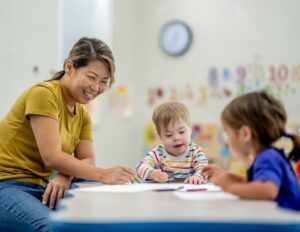
 View All
View All









 View All
View All